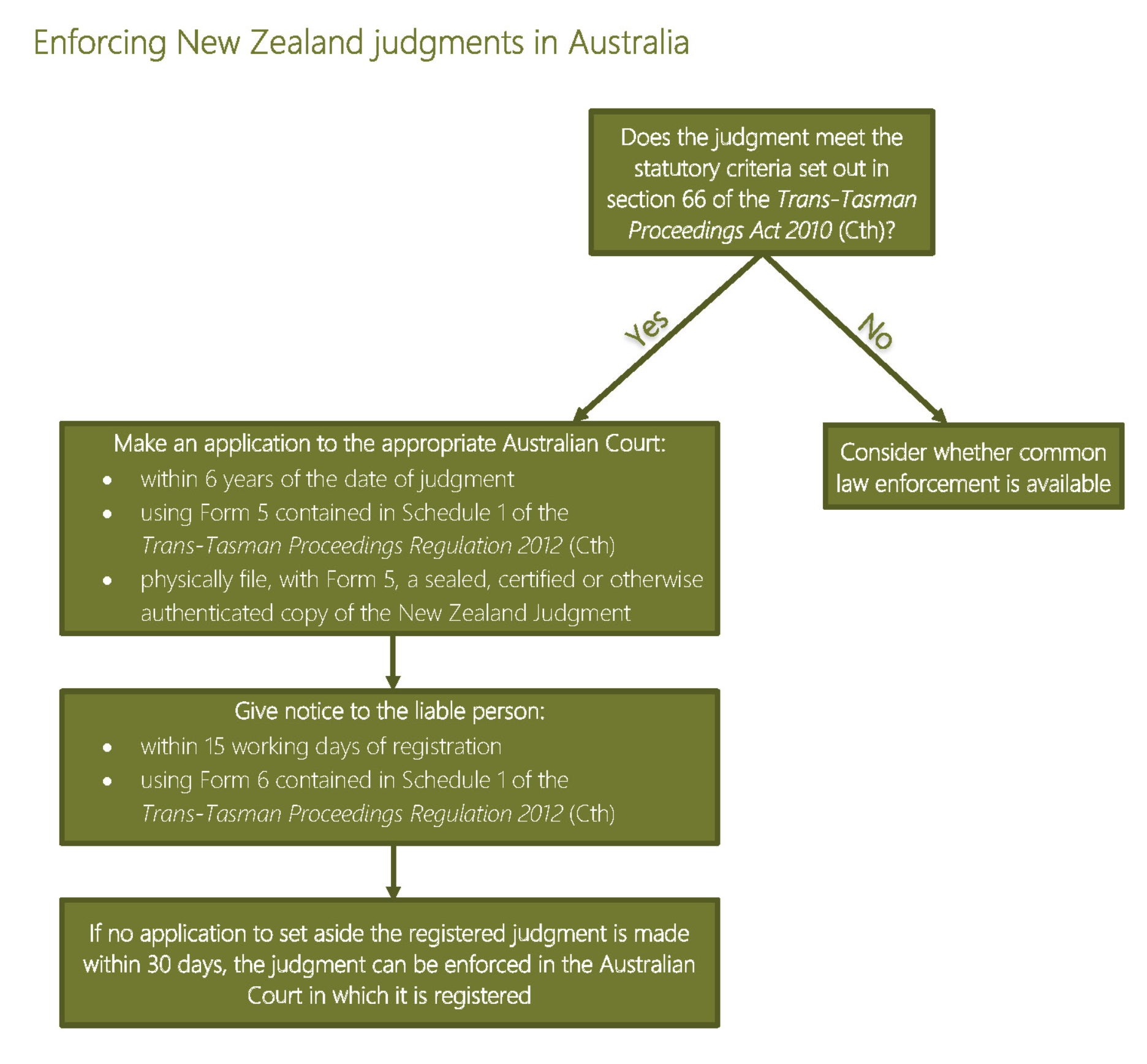Judgment criteria
The registration regime for the enforcement of New Zealand judgments in Australia is contained in Part 7 of the Trans-Tasman Proceedings Act 2010(Cth).
The types of New Zealand judgments that can be enforced in Australia are broad and include the following:
(a) money judgments;
(b) non-money judgments;
(c) judgments in criminal proceedings that involve an obligation to pay an (d) injured party compensation, damages or reparation;
(e) judgments that involve a regulatory regime criminal fine;
(f) judgments in market proceedings; and
(g) judgments registered under the Reciprocal Enforcement of Judgments Act 1934 (NZ).
The following New Zealand judgments cannot be enforced in Australia:
(a) orders under proceeds of crime legislation;
(b) orders relating to the granting of probate or letters of administration;
(c) guardianship orders;
(d) orders relating to the welfare, control and care of a child;
(e) judgments which are not final and conclusive (including freezing orders); and
(f) judgments which are not enforceable in the original New Zealand Court or Tribunal.
Registering the judgment
An application is filed in the relevant Australian Court. The Australian Court to which you apply to register a New Zealand judgment depends on the subject matter of the judgment. The process is as follows:
(a) judgments (other than judgments that impose a civil pecuniary penalty or a regulatory regime criminal fine) may be registered in any superior Australian Court (i.e. the Federal Court, Family Court or any Supreme Court) or any other Australian Court (except for the High Court) that has the power to give the relief in the New Zealand judgment;
(b) judgments which impose a civil pecuniary penalty (other than a market proceeding judgment) may be registered in any superior Australian Court or any other court that has the power to impose a civil pecuniary penalty of the same value as the penalty imposed by the New Zealand judgment;
(c) judgments to impose a regulatory regime criminal fine (other than a market proceeding judgment) may be registered in any superior Australian Court; and
(d) market proceeding judgments must be registered in the Federal Court.
The application must be in the form prescribed by the Trans-Tasman Proceedings Regulation 2012 (Cth) (Form 5 contained in Schedule 1 to the Regulations) and be filed with a sealed, certified or otherwise authenticated copy of the New Zealand judgment.
In most cases the application will be dealt with by a judicial officer on the papers without appearance in Court.
New Zealand judgments must be registered in Australia within six years of the date of the judgment.
Once registered, the entitled person must give notice of registration to the liable person within 15 working days after registration. This notice must be delivered by registered post to the liable person’s last known address or handed to the liable person.
Once properly registered, the New Zealand judgment has the same force, and may be enforced in the Australian Court, as if the judgment had been given by the Australian Court.
Limited grounds to set aside registered New Zealand judgment
Once a New Zealand judgment has been registered in Australia there are only very limited grounds for it to be set aside. Applications to set aside registration must be made within 30 working days that the liable person was given notice of the registration.
A registered New Zealand judgment can be set aside only on the following grounds:
(a) the judgment is contrary to Australian public policy;
(b) the judgment was registered in contravention of the Trans-Tasman Proceedings Act 2010 (Cth); or
(c) the subject matter of the judgment given was immovable property or an in rem judgment relating to movable property where neither the immovable or movable property was situated in New Zealand.

TRANS-TASMAN PROCEEDINGS ACT 2010 - SECT 66
Meaning of registrable NZ judgment
(1) A judgment is a registrable NZ judgment if:
(a) the judgment is a final and conclusive judgment that is given in a civil proceeding by a New Zealand court; or
(b) the judgment is a final and conclusive judgment that:
(i) is given in a civil proceeding by a New Zealand tribunal that is prescribed by the regulations; and
(ii) is of a kind prescribed by the regulations; or
(c) the judgment is a final and conclusive judgment that:
(i) is given in a criminal proceeding by a New Zealand court; and
(ii) consists wholly of a requirement to pay an injured party a sum of money by way of compensation, damages or reparation; or
(d) the judgment is a final and conclusive judgment that:
(i) is given in a criminal proceeding by a New Zealand court; and
(ii) consists wholly of an imposition of a regulatory regime criminal fine; and
(iii) meets the conditions (if any) of a kind prescribed by the regulations; or
(e) the judgment is a final and conclusive order made under the NZ Act or the NZ Evidence Act by a New Zealand court or tribunal, being an order for the payment of expenses incurred:
(i) by a witness in complying with a subpoena served on the witness in Australia under Division 3 of Part 5 of this Act; or
(ii) in connection with appearing remotely from Australia in a New Zealand proceeding under Division 3 of Part 6 of this Act; or
(f) the judgment is an NZ market proceeding judgment; or
(g) the judgment is registered in a New Zealand court under the Reciprocal Enforcement of Judgments Act 1934 of New Zealand.
(2) However, a judgment is not a registrable NZ judgment if it wholly or partly:
(a) relates to an excluded matter; or
(b) is a non-money judgment of a kind prescribed by the regulations; or
(c) is an order under proceeds of crime legislation; or
(d) is an order relating to the granting of probate or letters of administration or the administration of the estate of a deceased person; or
(e) is an order relating to the guardianship or care of a person who is incapable of managing his or her personal affairs; or
(f) is an order relating to the management of the property of a person who is incapable of managing that property; or
(g) is an order relating to the care, control, or welfare of a child; or
(h) imposes a civil pecuniary penalty of a kind prescribed by the regulations; or
(i) is an order that, if contravened by a person to whom it is directed, will make the person liable to conviction for an offence in the place where it was made; or
(j) relates to a matter of a kind prescribed by the regulations.
(3) For the purposes of subsection (1), a judgment is to be treated as final and conclusive even if:
(a) a person may appeal against it in a New Zealand court or tribunal; or
(b) an appeal against it in a New Zealand court or tribunal has not been finally determined.
(4) For the purposes of subparagraph (1)(b)(ii) if the judgment:
(a) is not made in connection with the performance of an adjudicative function; or
(b) is not enforceable without an order of a court; or
(c) imposes a civil pecuniary penalty.
Covid-19: High Court quashes ‘unlawful’ vaccine mandate for police and defence force staff
